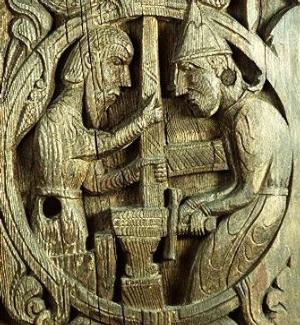
The Oxford English Dictionary defines allusion as “an implied, indirect, or passing reference to a person or thing” or “any reference to someone or something”. When it comes to literature, however, it becomes a difficult task to avoid accidentally falling into affective and intentional fallacies when exploring whether or not certain words, phrases, or narratives are meant by the author to be distinct and relevant allusions to particular people or events. In works such as Beowulf, moreover, the task of pointing out allusions and understanding their meaning becomes even more difficult due to the obscurity of their context and cultural situations. Nevertheless, what I aim to explore are some allusions to elements present in Old Norse literature which are readily available to us in the text: elements which we may assume to have been passed down to Beowulf’s author(s) through the culture of the Danelaw.
The Scyldings
One of the most notable of these allusions is that of the Scyldings. A prominent family not only in Beowulf, their stories also appear in Snorra Edda (Snorri Sturluson’s Prose Edda) and Hrólfs saga kraka (The Saga of King Hrolf Kraki). In the Edda, Skjöldur (Scyld Scefing), the founder of the Skjöldungar (Scyldings), is portrayed as a descendant of the god Óðinn himself. The legends of his descendants are recorded in Beowulf and Hrólfs saga kraka. Being slightly different in perspective to Beowulf, the focus of Hrólfs saga kraka is more so on Hroðgar’s nephew Hrólfur than on himself. Both narratives however include a troll-like being terrorising the halls at nightfall and a hero that comes and eradicates such threats.
Eotenas ond ylfe and gígantas
J.R.R. Tolkien notes in lines 112-113 the author’s use of two culturally different etymological sources to describe the race of Grendel and the descendants of Cain. On the one hand, Tolkien observes the use of gígantas in line 113 as a word borrowed from the Latin version of the Bible. On the other hand, he marks the words eotenas and ylfe in line 112 as distinctly Norse, coming from the words jötnar (giants) and álfar (elves). These words not only depict the author’s blending of pagan and Christian elements into the story of Beowulf, but as cultural allusions they furthermore offer a twofold perspective on Grendel’s background as a fiend – that is, he not only is an enemy of the Christians, being a descendant of Cain and the giants, but also at the sight of the pagan heroes he is considered an outcast of the Norse gods and humanity.
Wæls and Sigemund
The bard in Hroðgar’s hall recounts the story of Sigemund the dragon-slayer in lines 883-915 as words of praise, encouragement, and admonition to Beowulf. Similar narratives can be found in the Snorra Edda and the Völsunga Saga where Völsungur’s (Wæl’s) descendant Sigurður slays a dragon and takes possession of a treasure hoard. Placing these narratives in the context of Beowulf allows its author to portray ironies foreshadowing Beowulf’s death, but also comparative praise, as Sigurður is and will ever be remembered in Northern legend as Fáfnisbani – the slayer of the dragon Fáfnir – after his death.
Thus allusions such as these allow us to understand more comprehensively the story of Beowulf. They give the text particular shades which reflect dramatic ironies that are not always obvious when the allusions are missed. And although many of these allusions and possibly the text itself are rendered obscure to us as modern audiences, their importance to the Anglo-Saxon audience as antiquarian reflections and contemporary innovations should never be understated, wont as the Anglo-Saxons would have been to do so.
Works Consulted:
Heaney, Seamus. Beowulf. New York: W.W. Norton & Company, 2000. Print.
Tolkien, J.R.R. Beowulf: A Translation and Commentary. Ed. Christopher Tolkien. London: Harper Collins Publishers, 2014. Print.
— . The Monsters and the Critics and Other Essays. Ed. Christopher Tolkien. London: George Allen & Unwin Publishers, 1983. Print.





